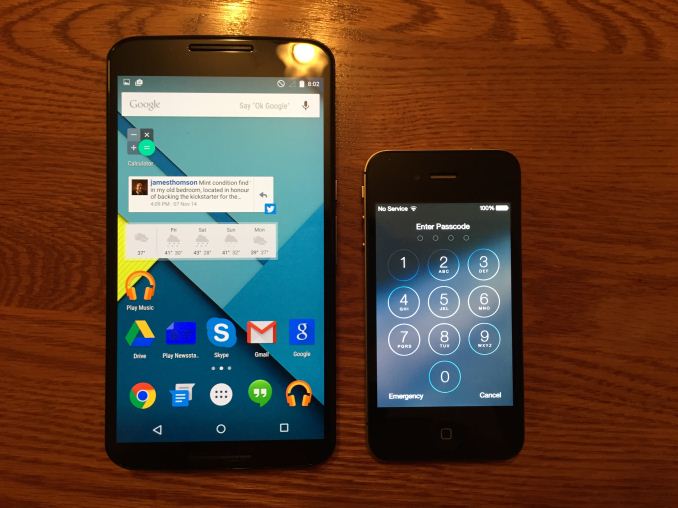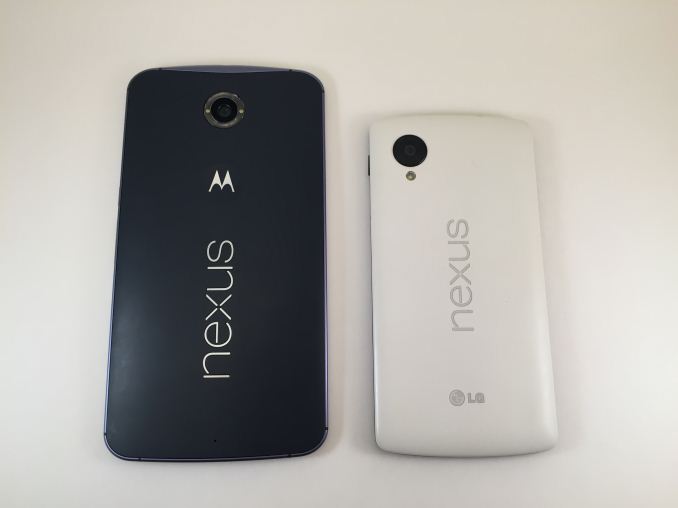The Nexus 6 Review
by Brandon Chester on November 12, 2014 1:00 PM ESTFinal Words
When I started reviewing the Nexus 6 I was very apprehensive. Not because I worried that it would be a bad device, but because I had never used such a large phone before. We have come a long way from the days where a 3.5" was considered huge for a phone. However, I had previously owned an iPad Mini and while the Nexus 6 was not that large, it helped me to think of ways I could use it that expanded beyond how I would typically use a smaller smartphone. At 5.96", the Nexus 6 provides an enormous window into all of your content, and allows you to freely do things like view desktop web pages and edit documents without the cramped feeling that arises when doing the same tasks on a smaller device like the Nexus 5 or the HTC One (M7). This also comes with downsides like the loss of single handed usability. The choice between a larger or smaller smartphone will obviously involve tradeoffs, but these do not necessarily make a certain size better than others. What I can say is that the Nexus 6 offered a very different experience from the devices in the 4.7" to 5" range that I was used to.
I think users that are interested in watching many videos on their device will be happy with the Nexus 6. Although stock Android unfortunately does not have a dedicated video application, Google Play is home to some of the best video players for mobile devices. After overcoming some compatibility issues with Android Lollipop, I was able to enjoy some of the best movie watching experiences I have had on a mobile device. Although the poor display calibration does negatively impact some media, films with a heavy use of black and dark colors like The Dark Knight look amazing on the 5.96" AMOLED display. I might even go so far as to say that for certain content the Nexus 6 provides an even better video experience than a tablet with a less extreme aspect ratio and an LCD display like the Nexus 9 or the iPad Mini.
Although the Nexus 6 is an additional device in Google's lineup, and fulfills a new role as a device, it's still going to be compared to the Nexus 5 purely due to its name and the timing of its release. I don't think that buyers will really need to decide between the Nexus 5 and Nexus 6, as they play in completely different markets and fulfill different roles. A user who wants a phablet won't be content with the Nexus 5, and conversely someone who wants a one-handed device won't like the Nexus 6. The Nexus 6 is better compared to other phablets like Samsung's recently released Galaxy Note 4 which shares many of the same specifications and is roughly the same price. I think that Samsung currently offers a better phablet experience with regards to software, with multi-window views, specialized landscape layouts, and S Pen integration. The display and battery life are also better on the Galaxy Note 4. The Nexus 6 has its own advantages as well, namely its build quality and guaranteed software updates. I don't think I can definitively say that one is better than the other, as they both have strengths and weaknesses which will make one more appealing to a user than the other based on what that user wants in a phablet. The Nexus 6 definitely leans strongly towards the phone side of the phablet equation though, which could be a bit disappointing for those that are looking for more.
Price is also a consideration with the Nexus 6. At $649 it represents a new style of premium pricing for Google's flagship device, and it means that the Nexus phone now competes with other flagship phones in every regard. After taking in everything that the Nexus 6 is, and everything it isn't, it's hard to come to a conclusion about if it meets the expectations set by its price tag. On the software side there are currently some issues with animation performance, but as a Nexus device you'll always get the latest updates and any future performance fixes will arrive as soon as possible. On the hardware side it sports great build quality, a camera which is greatly improved from the Nexus 5, a sharp display, and performance which is essentially the best that you'll find in an Android phone. But it's not without its issues, namely the poor display calibration and lower battery life than its competition. My need for a well calibrated display means that I personally think that Google may have aimed just a bit too high with their price point. However, anyone who isn't as bothered by the wider gamut and relative color inaccuracy should definitely feel comfortable paying the premium price that Google is asking.
Overall, I think that Google and Motorola have built a solid device. It isn't without its issues, but there's a lot to like, even if you're someone who has never used a phablet before. I had always been somewhat of a skeptic regarding massive phones; I didn't understand the appeal. But after using one, I can see how having a massive display to view all your content can be really beneficial by enabling forms of productivity that simply can't be done comfortably on smaller devices, and by making activities like viewing photos and watching videos significantly more engrossing. Not only did it change my mind about the appeal of phablets, it also changed my mind about Google's ability to compete in the premium device segment of the market. The Nexus 6 holds its own against all the other high end devices that we've seen released this year, although the Galaxy Note 4 with its more phablet oriented software features and hardware advantages might be a better device overall. But those who want a large device and value having software support directly from Google won't be disappointed by the Nexus 6.












136 Comments
View All Comments
mars2k - Friday, November 14, 2014 - link
Wow, old age is setting in. “I don’t like big phones so why would anyone else”. I just got my first phablet Galaxy Note 4, they did a great job on that btw. Larger up to a point is better for me. I travel and my phone is my GPS. Much better on the larger phone. Does anyone remember what it was like to have good paper maps? I could go on about how size really does matter but you get the point.drtunx - Friday, November 14, 2014 - link
Hi Brandon, this was an excellent review. I really enjoyed reading it. The poor display calibration is a huge disappointment especially after the Nexus 5, like you stated. Question: Do you think display calibration can be improved with an OTA ? Its almost a deal breaker for me and would love to know your thoughts on whether there is even a possibility of fixing that like many other software bugs currently present. Thank you.resma - Friday, November 14, 2014 - link
Turning down the screens to 200 nits (with modern screens that is about 1/3 of the maximum brightness) is a huge advantage to LCD displays, since AMOLED uses approx the same amount of energy until the pixels are really off.Please try to compensate for this in your next review, by doing the same test with maximum brightness and adding that chart as well!
Brandon Chester - Saturday, November 15, 2014 - link
Doing the test with maximum brightness would be an unfair comparison of battery life.TheEvilBlight - Monday, November 24, 2014 - link
Max battery life is a use case for in the open under bright light.hrrmph - Friday, November 14, 2014 - link
Nexus and Apple are just so scrawny on storage. I'm ready for 1TB phones and tablets already.polygon_21 - Saturday, November 15, 2014 - link
if apple can have an iphone 6 plus.. i would like to have a nexus 6 minus.. ie.. 4.5-5' devicezodiacfml - Saturday, November 15, 2014 - link
Nah, too expensive. I don't see myself giving up the N5 for this and I have improved its battery life through one app that disables other active apps. It is now a very decent smartphone for me.I just don't like the blacks of the N5 when the display is dim.
My next Nexus would be a slightly larger N5 with an AMOLED full HD display, Curved back/larger battery, stereo speakers, iPhone spec sensors or larger pixels, and h.265 @ 1080p60.
p51d007 - Sunday, November 16, 2014 - link
I'm a power USER, not someone that tinkers with a device. Take it out of the box, plug it in and USE it. Benchmarks don't mean a thing to me, neither do specs, AS LONG as the device is quick & stable. Heck, I kept 4.1.2 on my Note1 because it was flat out stable. Got a Mate2, "saddled" with mid tier specs & OS 4.3JB, but when you optimize a device for the hardware/software, you get a benefit. This thing is flat stable & flies...not from a performance standpoint of benchmarks (I don't use my device to play games, it's a WORK device). No lag (Nova Launcher), apps are quick to load, not one FC or lock up in 6 months. Pay 600 or more for a device...it's your choice, but when I find one that works for 300 bucks? Sign me up every time.RDS - Monday, November 17, 2014 - link
Is this a "One use case for all" debate :) :)Is it a "phone" or is it a Hasselblad with Zeiss Lenses for $5.00. that includes phone capability :)
$649 for an unlocked aka easy to root and manage device is still cheaper than any other vendor's phone unlocked and not quite as easy to root and manage.
There are quite a few very good camera apps for Android out there are the people complaining about camera quality using those or are they complaining about the stock camera app comes with the device. Of course none of these apps are going to convert you phone camera lens into a Nikon or Zeiss or Canon. So what are we really whining about here.
I thought the main value point of the Nexus platform was that you could install whatever you wanted or thought you needed on it.